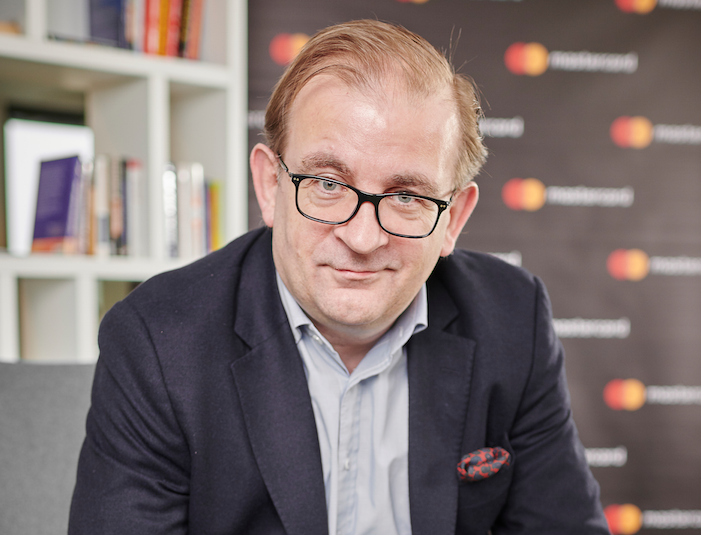Card clash: Mastercard UK’s Mark Barnett on the battle for payments market share

The likelihood is that, reading this, you have a Visa debit card somewhere on your person. Only two per cent of Britons currently have a Mastercard debit card, but that will change shortly after a string of wins for the US giant which will see its market share increase by 10 times.
TSB and Santander are the two latest banks to flip, following in the footsteps of all of the digital-only "neo-banks" such as Starling, Monzo, and Revolut, with Mastercard's market share expected to rise to around 22 per cent once the transition is complete within the next two years.
Mark Barnett, president for the UK, Ireland, the Nordics and Baltics, is the man persuading bank executives to make the change. Sitting in a cafe near the firm's Canary Wharf office, the UK head office, Barnett says the pricing for banks is "pretty similar" to Visa, but that clients said Mastercard was "hungrier" with "differentiated products and services" after a series of acquisitions and investments in technology.
Now his sights are set on the big four UK banks.
"We still want to go after one of the big guys," he says. "There's four other big guys left. We're working very hard on flipping more portfolios."
Duopoly dismissal
To the outsider the payments business can seem like a tug of war between the two giants, but Barnett clearly has his eye on other disruptors – potentially with bigger balance sheets – such as Paypal, Apple, Google and Amazon from the US, or Samsung, China Unionpay and Alipay from Asia.
"The idea that it's just two is a little outmoded," he says. "There are several other big players out there and the competitive landscape is changing all the time."
With 98 per cent of the population holding a debit card, according to UK Finance figures, that will clearly be a major battleground for years to come, but the firm is also keeping a weather eye on developments beyond the mainstream.
The firm is working on projects using blockchain, the technology du jour, with "large cross-border payments" particularly promising. These are currently run through the Swift messaging service through correspondent banks scattered around the world.
"There's no reason the messaging service couldn't be blockchain and the pipes underneath to make the transaction [could be] Mastercard's network," Barnett says.
New ecosystem
However, while blockchain-based services are still a "few years away" from coming to market, the firm is focused on building the footprint of other new technologies. Barnett, who reports to Javier Perez on the global firm's board, admits that the incentive to innovate is at least partly driven by the firm's underdog status in the UK and the desire to find other ways of "getting at that everyday spend".
Masterpass, a scheme similar to Paypal's wallet for e-commerce, and rival service Visa Checkout have not really "taken off", says Barrett, but hopes are high for "pay by bank app", a new service which will integrate with the bank apps millions of consumers already have on their mobile phones. The technology was designed by Vocalink, the firm bought by Mastercard for £700m last year. Unlike with cards, the tech requires consumers to "push" the payment from their account using Faster Payments infrastructure, giving what Mastercard says is an extra layer of security.
The technology will be in the hands of "double-digit millions" of consumers by the first quarter of next year, with HSBC and another large bank expected to integrate it shortly. Meanwhile, it has also signed up three big acquirers which together account for 85 per cent of the British e-commerce market on the vendor side.
"It's always hard standing up a new ecosystem because payment is a chicken and egg thing," Barnett says. "You've got to have retailers and you've got to have consumers with cards, but we're doing pretty well."
Going cashless
Whichever method of paying dominates – or if there is no single winner – the UK is going contactless at an astonishing rate, with card payments overtaking cash for the first time ever last year, according to the British Retail Consortium. Yet the UK still lags behind some countries, including in Scandinavia, part of Barnett's portfolio.
"We're getting there in the UK – with contactless cash is being taken out of the system very very quickly indeed," he says – although he adds there will always be demand for some cash, particularly from older users.
The "tipping point" for the UK was the effort to persuade Transport for London to allow contactless payments on the tubes and buses. Mastercard, Visa and American Express launched the service at the same time in 2014. Now Mastercard is working on contactless for Big Issue sellers, in dynamic posters for the World Food Programme, and for the British Legion's poppy sellers ahead of Remembrance Day.
Persuading consumers and firms to make the leap together on something as everyday as payments has proven difficult in the past – and the antiquated payments experience in the US shows that even the most advanced economies can take a long time to change their habits.
But being a challenger in the UK – a strange position for a $212bn (£161bn) company – has clearly given Mastercard a big incentive to up their game in the battle to carry our payments.